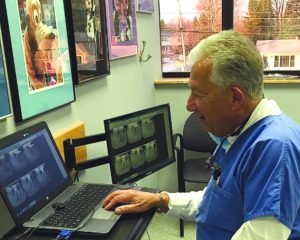Reflections on 51 years in practice
Dr. Seidberg shared the following history and accomplishments with Endodontic Practice US.
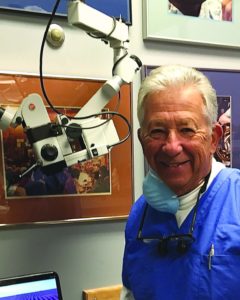 Dr. Seidberg reviewing an X-ray (Dexis™ system)
Dr. Seidberg reviewing an X-ray (Dexis™ system)
Dr. Bruce Seidberg was born in Syracuse, New York. His mother was a bookkeeper in a department store and his father, a barber — both survivors of the WWII depression era and who recognized the importance of education. Throughout primary and secondary school, they always encouraged him to pursue a professional career path. In high school, he was active in the band (a drummer), the cross-country track team, and as the manager of the basketball team. He entered dental school after 3 years of undergraduate school at the University of Buffalo. He and his wife, Judy, have three children: Neal, Chairman of the Pediatric ICU at Golisano Children’s Hospital; Dan, an Attorney and CEO of Iamresponding.com, and Allison, an event planner and a healthcare administrator; they have six grand-children and a Bichon Frise, Callie.He received his DDS from SUNY Buffalo and served in the Navy and, after a year at the Boston Naval Shipyard, was asked to be the base’s endodontist. He later received his Certificate of Proficiency and Master’s (MScD) degree in Endodontics from the Boston University School of Graduate Dentistry. Fast-forward, he has maintained active participation in the dental profession and has been in leadership roles in just about every organization he is a member of. He is a Diplomate of the American Board of Endodontics and the American Board of Medical Malpractice, a Fellow of the American College of Dentists, the American Association of Hospital Dentistry, the Pierre Fauchard Academy, and the American College of Legal Medicine. He is a member of the American Dental Association, American Association of Endodontists, American Association of Dental Editors, Alpha Omega International Fraternity, New York State Endodontic Association, NYS Dental Association, NYS Board of Dentistry, and the American Association of Dental Boards, as well as other local dental societies.
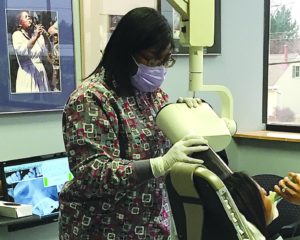

Dr. Seidberg is a former Associate Professor of Endodontics at SUNY at Buffalo and Chair of the Postgraduate Endodontic Program that he and Dr. Jim Guttuso started in 1967. He was also the former Director of a General Dentistry Residency Program that he was a co-founder of at the St. Joseph’s Hospital Health Center in Syracuse. He is currently Chief of Dentistry at Crouse Hospital in Syracuse, New York, Chairman of the American Board of Medical Malpractice, and Secretary of the ACLM Foundation. Dr. Seidberg has contributed many articles to the dental literature and a chapter in the dental text Dentistry for the Special Patient, the legal text Legal Medicine, and the 6th edition of Ingle’s Endodontics. Dr. Seidberg served as Associate Editor of the Fifth District Dental Society Bulletin (NYS), Editor of the Boston University School of Graduate Dentistry Endodontic publications (Quarterly, Newsletter, and Journal) for 25 years, on the Scientific Advisory Panel for the Journal
of Endodontics, Managing Editor of the ACLM Communiqué, and Editor-in-Chief of the AAE District II Endodontic Forum; and he served a 4-year term on the American Dental Association Council on Communications.
He has lectured at national and inter-national meetings about the fields of dentistry and law. He has served two terms on the AAE Foundation Board, including a term as secretary-treasurer, vice chairman of the American Dental Association Council on Communications, and two terms each on the Board of Governors of the American College of Legal Medicine and the Board of Directors of the American Association of Endodontics. He was awarded the President’s Award from the AAE in 2001, becoming just the second individual to receive that honor in the 54-year history of the organization. He was also presented with a President’s Award for Service from ACLM in 1992, 1993, and 1994 and the ACLM Gold Medal in 2013 for excellence and participation on behalf of dentistry and law. He has completed two terms as President of the New York State Association of Endodontists, represented the State Endodontists on the New York State Dental Association Board of Governors, and served 2 years as chairman of the NYS Section of the Pierre Fauchard Academy. Dr. Seidberg is a Past President of the Syracuse chapter of Alpha Omega, the BU Endodontic Alumni Association, and the Cayuga County and the Onondaga County Dental Societies. He was the 48th President of the American College of Legal Medicine, the only dentist to serve in that capacity. He participates in the NERBS organization and is currently serving as Vice Chairman of the NYS Board of Dentistry. Outside of the dental profession, he is a Past Commander of the JWV Post 131 and is the Central New York Director of the Special Olympics Special Smiles Program.
Dr. Seidberg, is your practice limited to endodontics?
Yes, my practice is limited 100% to the traditional school of endodontics using
the improved technology with the basic Schilderian principles and without the allowable expanded services offered within the last decade such as periodontal modifications, restorative buildup efforts, and implants.
Why did you decide to focus on endodontics?
Dentistry is that part of medicine where patients need teeth to eat and speak properly. Endodontics is the one exciting phase of dentistry that enables patients to save their teeth that would otherwise be extracted. It is rewarding to be able to save a tooth, even if it has to be done heroically. It’s generally a feeling akin to that of an obstetrician bringing life into the world; we are giving extended life to teeth and bringing smiles to people, and that’s a great feeling to be able to help people and to improve their health. As Dr. Herb Schilder always said, the best implant is a natural tooth, and in endodontics, we can usually preserve that natural tooth.
How long have you been practicing, and what systems do you use?
I’ve been in practice for 51 years, starting as the base’s endodontist in 1964 at the Boston Naval Shipyard, and then returned to school and graduated from the Boston University School of Graduate Dentistry and finally the private practice of endodontics in Syracuse, New York since 1967. I still have a strong passion for the specialty and helping patients of all ages. I use a combination of systems, but primarily using the Dentsply Tulsa Dental Specialties armamentaria, continuing the use of hand instrumentation, and incorporating rotary systems. I also use the DEXIS™ digital radiography system and JEDMED and Seiler microscopes.
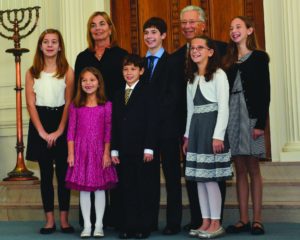
What training have you undertaken?
My dental degree is from the State University of New York at Buffalo. While in the Navy in Boston, I was sent to a series of courses at the Boston University School of Graduate Dentistry under the tutorship of Dr. Herb Schilder, where I later studied and received my Certificate of Proficiency and Master of Science Degree in Endodontics. I continue to attend numerous continuing education courses through the AAE and other dental organizations and study clubs.
Who has inspired you professionally?
Dr. Herbert Schilder was most inspiring and certainly most influential in my professional practice of endodontics, as a teacher and as a friend. Drs. Harold Levin and Seymour Melnick exemplified the characteristics of a professional and were influential in my development of a practice. Dr. Michael Fallon inspired me as a professional leader with his philosophy of affability, availability, and ability that remain the basis of my professional character. Drs. Cyril Wecht, Stuart Reuter, Phil Shelton, and Robert Buckman (to name just a few) were inspirational in the legal aspect of my profession.
What is the most satisfying aspect about your practice?
The respect I receive from my colleagues, staff, and patients. As one of my colleagues, Dr. Dan Orr, has said: “What better a vocation is there that affords the daily opportunity to relieve pain and suffering while restoring function.” I could not agree more. Every day is satisfying when patients can be helped. Not one day is more satisfying than another, and that’s what makes it so exciting to be an endodontist!
What has been your biggest challenge?
My biggest challenge is to fit all that I want to do into a day in the office, spend quality time with my family, and be able to take enough time off to “smell the roses.”
What would you have become if you had not become a dentist?
Although my college advisor told me to be an accountant, I’ve wanted to be a dentist all of my life; and it was a close friend’s father, Dr. Joseph Watson, a general dentist, who was the constant dental professional encouraging his son, Jeff, and me to apply to dental school. Of course, my parents were always encouraging me to pursue my goal, and then my wife, Judy, encouraged me to specialize. I never had a second choice.
What is the future of endodontics and dentistry?
The future is very bright for both the specialty of endodontics and the profession of dentistry. The constant advances in technology have contributed to being able to do better dentistry. Recognize that technology only enhances treatment; it does not replace the basic principles of treatment. Each advance brings more excitement to the practitioner, and that should be a reflection in the growth of each practice. I’d like to see it easier for dentists to cross state lines to practice, especially after being in practice for a few years. There is no logic for patients to be able to be treated on each coast but for dentists to be limited by licensure in one (or more) locations. If I can treat a Floridian visiting in New York State, why can’t I treat that same person in Florida as a specialist without having to take a general dentistry exam? But that’s a whole other issue involving states’ rights, and that is slowly being resolved. Nevertheless, there is pride to being a dentist, and the rewards of relieving the pain and helping patients are overwhelming. There are alternatives in treatment when a tooth must be removed, but you can’t beat the feeling of saving teeth and making patients healthy and happy.

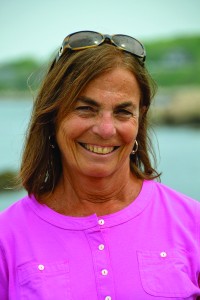
What are your top tips for maintaining a successful practice?
Treat your staff and patients with respect. Be an understanding and caring person. Maintain a professional attitude in and outside of your office.
What advice would you give to budding endodontists?
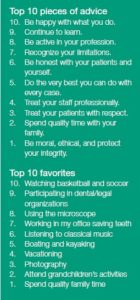 Whether you are a budding endodontist or a new dental practitioner, you must practice with integrity, morality, ethics, and sensitivity. Be honest with your patients and recognize your limitations. Don’t be afraid to refer to a colleague or to seek help. You cannot treat the entire world; there are enough patients for everyone. You cannot please everyone, but you can certainly try. Every treatment you perform will not be successful as hard as you might try. You have to look in the mirror every night and every morning, and you should be able to do that without remorse.
Whether you are a budding endodontist or a new dental practitioner, you must practice with integrity, morality, ethics, and sensitivity. Be honest with your patients and recognize your limitations. Don’t be afraid to refer to a colleague or to seek help. You cannot treat the entire world; there are enough patients for everyone. You cannot please everyone, but you can certainly try. Every treatment you perform will not be successful as hard as you might try. You have to look in the mirror every night and every morning, and you should be able to do that without remorse.

What are your hobbies, and what do you like to do in your spare time?
I like to spend my spare time with my grandchildren and attend as many of their activities that I can; there I put my photography hobby to work photographing them playing sports, in their concerts, or just in general. I’ve been taking photographs for many years and have won a number of awards. I also enjoy kayaking, boating, and vacationing but, most of all, spending time with my family.
Why did you decide to pursue law in addition to endodontics?
I was chairman of my local dental society mediation committee for nearly a decade, and each case brought its own unique set of issues. I wanted to be fair but remain within legal boundaries and decided that it would be interesting to study law. Most things we do in dentistry have a legal twist. After law school, I became a member of the American College of Legal Medicine, an organization of dual-degree doctors (MD/JD and DDS/DMD/JD). I decided that my passion was for endodontics and that I was not going to change my professional focus, so my practice of law concentrated on risk management lectures, helping colleagues avoid legal entanglements, and reviewing alleged dental malpractice cases around the country. I’ve had chapters published in several legal and dental texts and papers published in several journals. My legal ventures and leadership abilities were highlighted when I became the first dentist to be elected President of the prestigious premier legal organization, the American College of Legal Medicine, and to receive its highest award, the Gold Medal.
Stay Relevant With Orthodontic Practice US
Join our email list for CE courses and webinars, articles and mores

